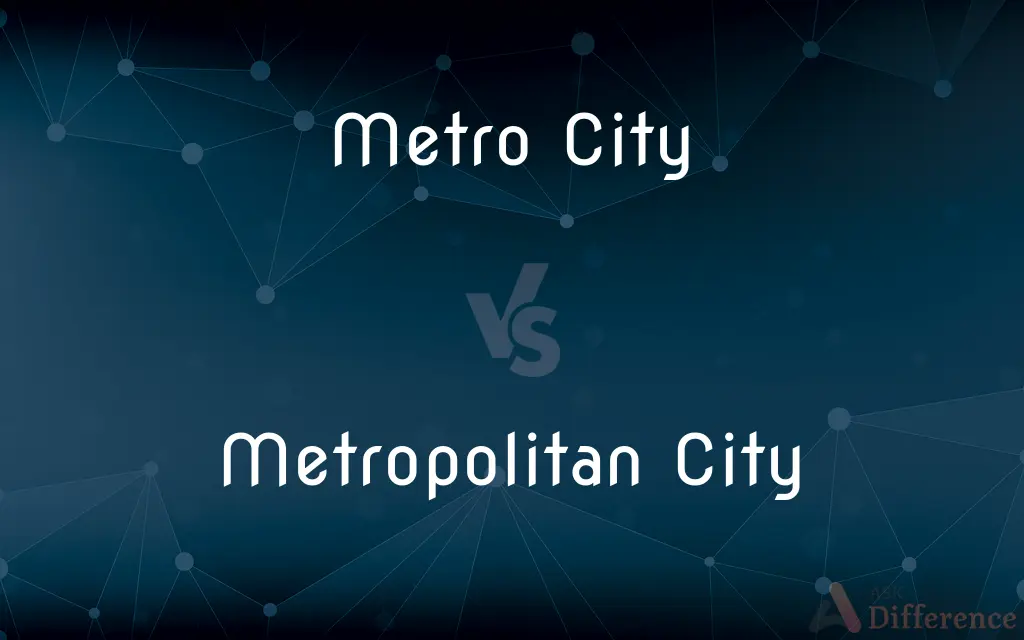Metro City vs. Metropolitan City — What's the Difference?
Edited by Tayyaba Rehman — By Fiza Rafique — Published on November 3, 2023
Metro City and Metropolitan City both refer to large, densely populated urban areas, but "Metro City" is a more informal term while "Metropolitan City" is formal and often denotes a central city with its suburbs.

Difference Between Metro City and Metropolitan City
Table of Contents
ADVERTISEMENT
Key Differences
Metro City is a term that's used colloquially to refer to cities with significant populations and infrastructure. It's an informal way to talk about a city that's bustling with activity and urban life. Metropolitan City, on the other hand, is a more formal term that usually describes a primary city, possibly including its surrounding suburbs and satellite cities.
In many contexts, Metro City might be used to highlight the city's modern amenities and the urban lifestyle it offers. Metropolitan City implies a larger geographic and administrative area, emphasizing its importance as a hub for the surrounding region.
Both terms convey the idea of urbanization and the concentration of services, businesses, and cultural activities. Yet, when someone speaks of a Metro City, they might be focusing on the core urban area, whereas Metropolitan City often brings to mind the broader region, including its suburban or even rural outskirts.
Metro City could also sometimes be a shorthand for the city's metro or subway system, showcasing the city's modern transportation network. Metropolitan City, by contrast, often refers to an official designation that might be used in government documents or statistics.
In essence, while both terms point to large urban centers, Metro City is more casual and might be centered on the urban lifestyle, while Metropolitan City has a more formal tone and could encompass a wider region.
ADVERTISEMENT
Comparison Chart
Terminology
Informal
Formal
Scope
May refer to the city core or urban lifestyle.
Often includes the city and its surrounding areas.
Usage
Common in everyday speech.
Seen in official or administrative contexts.
Implication
May imply modern amenities and urban culture.
Emphasizes the city as a regional hub.
Associated Ideas
Urban lifestyle, possibly the city's metro system.
Larger geographic and administrative area.
Compare with Definitions
Metro City
A large urban area known for its modern infrastructure and lifestyle.
He moved to the Metro City in search of better job opportunities.
Metropolitan City
A large urban center serving as a hub for its region.
Businesses are flocking to the Metropolitan City for its strategic location.
Metro City
A term sometimes synonymous with the city's metro or subway system.
The Metro City has an extensive subway network.
Metropolitan City
A city that's at the heart of a larger urban agglomeration or metropolitan area.
The airport in the Metropolitan City serves millions of passengers annually.
Metro City
An informal term for cities with significant populations and amenities.
Living in a Metro City has its pros and cons.
Metropolitan City
A formal designation for a primary city, including its suburbs and surrounding areas.
The Metropolitan City has a diverse population spread across its many boroughs.
Metro City
A city where urban culture and conveniences are predominant.
The nightlife in the Metro City is vibrant and exciting.
Metropolitan City
A city that has official recognition, often used in administrative or statistical contexts.
The census data for the Metropolitan City showed a steady population growth.
Metro City
A city that boasts of urban conveniences and a fast-paced life.
She loves the hustle and bustle of the Metro City.
Metropolitan City
A term emphasizing the city's broader geographical and administrative scope.
The Metropolitan City's governance requires coordination between various municipalities.
Common Curiosities
Does "Metropolitan City" include suburbs?
Yes, it often encompasses the central city and its surrounding areas.
Which term emphasizes urban lifestyle more?
"Metro City" often emphasizes urban conveniences and culture.
Can "Metro City" and "Metropolitan City" be used interchangeably?
While similar, they have different nuances; "Metro City" is casual, while "Metropolitan City" is formal.
Is "Metropolitan City" used in official documents?
Yes, it's often seen in administrative or statistical contexts.
Is "Metro City" a formal term?
No, "Metro City" is an informal term.
Which term has a broader geographical scope?
"Metropolitan City" often indicates a wider region.
Can a city be called a "Metro City" without a metro system?
Yes, the term doesn't strictly refer to the presence of a metro system.
Why might someone use "Metropolitan City" instead of "Metro City"?
They might choose "Metropolitan City" for its formal tone or to emphasize the broader region.
Does "Metropolitan City" always have a larger population than "Metro City"?
Not necessarily. The terms focus on different aspects, not strictly population size.
Can "Metro City" refer to a subway system?
Sometimes, it can imply the city's metro or subway system.
Is "Metro City" a city with a metro system?
Not necessarily, though it can sometimes imply that.
Are the amenities and facilities similar in both?
Generally, both terms imply a concentration of amenities, but "Metro City" might highlight modern conveniences while "Metropolitan City" denotes a regional hub.
What's the main focus of "Metropolitan City"?
It emphasizes the city as a regional hub, including its surrounding areas.
Does every large city qualify as a "Metro City"?
Not always, but it generally refers to significant urban areas.
Are all metropolitan cities also metro cities?
While all metropolitan cities are large urban areas (like metro cities), the terms emphasize different things.
Share Your Discovery

Previous Comparison
Belgian Malinois vs. Dutch Shepherd
Next Comparison
Tools vs. EquipmentAuthor Spotlight
Written by
Fiza RafiqueFiza Rafique is a skilled content writer at AskDifference.com, where she meticulously refines and enhances written pieces. Drawing from her vast editorial expertise, Fiza ensures clarity, accuracy, and precision in every article. Passionate about language, she continually seeks to elevate the quality of content for readers worldwide.
Edited by
Tayyaba RehmanTayyaba Rehman is a distinguished writer, currently serving as a primary contributor to askdifference.com. As a researcher in semantics and etymology, Tayyaba's passion for the complexity of languages and their distinctions has found a perfect home on the platform. Tayyaba delves into the intricacies of language, distinguishing between commonly confused words and phrases, thereby providing clarity for readers worldwide.











































